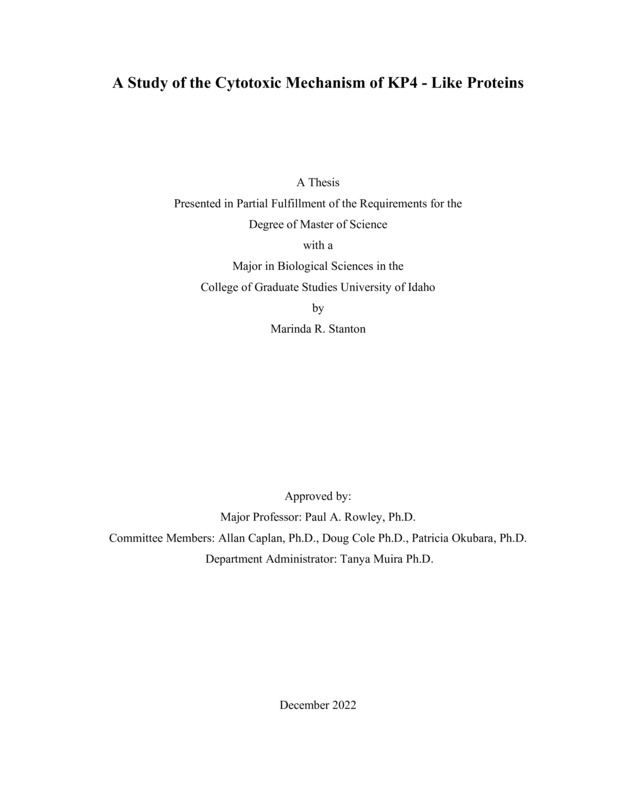A Study of the Cytotoxic Mechanism of KP4 - Like Proteins
Stanton, Marinda. (2022-12). A Study of the Cytotoxic Mechanism of KP4 - Like Proteins. Theses and Dissertations Collection, University of Idaho Library Digital Collections. https://www.lib.uidaho.edu/digital/etd/items/stanton_idaho_0089n_12517.html
- Title:
- A Study of the Cytotoxic Mechanism of KP4 - Like Proteins
- Author:
- Stanton, Marinda
- ORCID:
- 0000-0002-4784-5022
- Date:
- 2022-12
- Embargo Remove Date:
- 2023-07-24
- Program:
- Biological Sciences
- Subject Category:
- Biology; Microbiology
- Abstract:
-
Crop loss and spoilage caused by fungi cost the global economy over $60 billion annually, with $21 billion in the United States alone. Ustilago maydis is known to produce an antifungal protein known as Killer Protein 4 (KP4). Using KP4 in transgenic plants resulted in increased resistance to multiple crop pathogens, including corn smut, head blight in wheat, stinking smut, and black rot. KP4 has been shown to inhibit fungal growth by blocking calcium channels. Homologs of KP4 (KP4-Like; KP4L) have been identified, but the functions of the proteins remain unknown. These proteins could be a potential resource for creating new antifungals. A survey of KP4L proteins showed increased diversity and strongly conserved primary and secondary structures. Eight KP4L proteins were used to transform the model yeast Saccharomyces cerevisiae to study their expression and antifungal activities. However, the induction of KP4L genes caused growth arrest in S. cerevisiae, but with the resumption of growth when arrested cells were plated on non-inductive media. To identify if this toxicity was due to KP4L export outside of the cell, an N- terminal truncation mutant lacking an extracellular signal sequence was created. The N-terminal truncation mutant did not induce growth arrest. To confirm the extracellular export, a C-tag was fused to the KP4L C-terminus, and extracellular KP4L was detected by Western blotting. Importantly, the N-terminal truncation mutant that lacked a signal sequence did not get excreted outside of the cell. These results indicate that KP4L proteins are targeting the cell surface for toxicity like KP4 and could be utilized as novel antifungals in crops. Further experiments will be needed to confirm the KP4L mechanism.
- Description:
- masters, M.S., Biological Sciences -- University of Idaho - College of Graduate Studies, 2022-12
- Major Professor:
- Rowley, Paul A
- Committee:
- Okubara, Patricia; Caplan, Allan; Cole, Doug; Miura, Tanya
- Defense Date:
- 2022-12
- Identifier:
- Stanton_idaho_0089N_12517
- Type:
- Text
- Format Original:
- Format:
- application/pdf
- Rights:
- In Copyright - Educational Use Permitted. For more information, please contact University of Idaho Library Special Collections and Archives Department at libspec@uidaho.edu.
- Standardized Rights:
- http://rightsstatements.org/vocab/InC-EDU/1.0/

